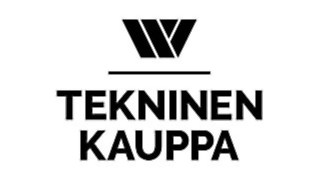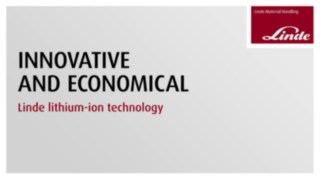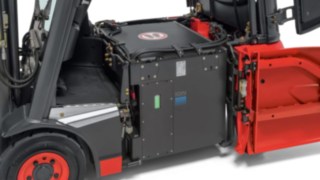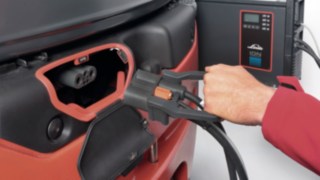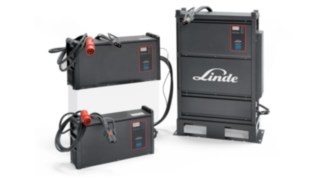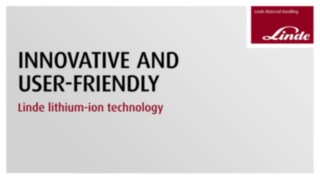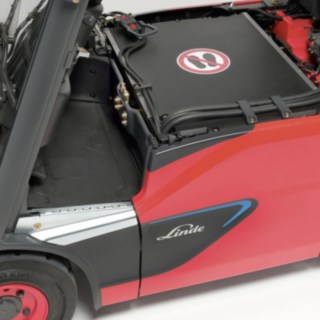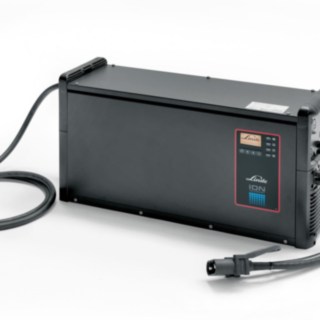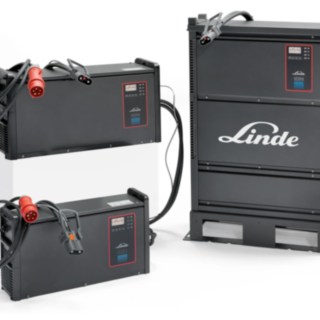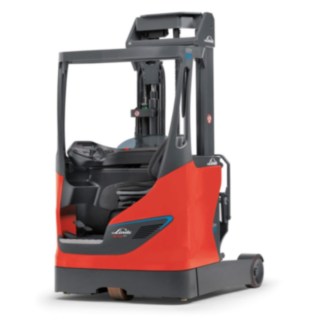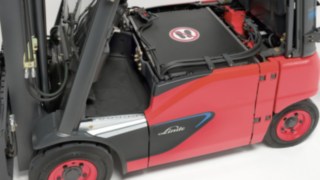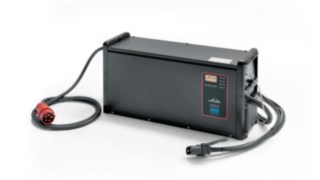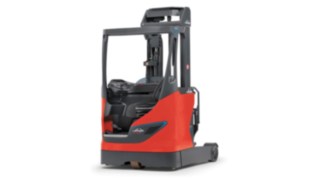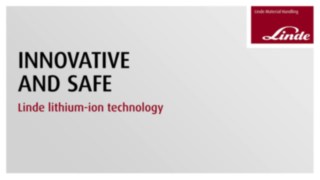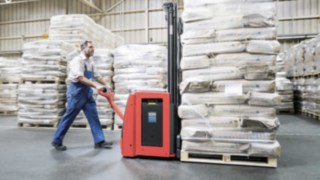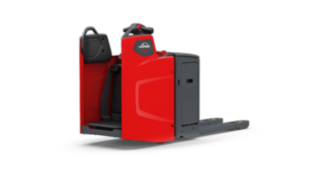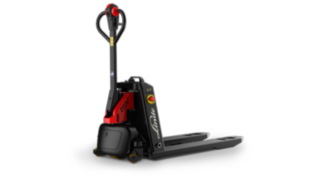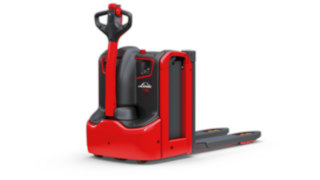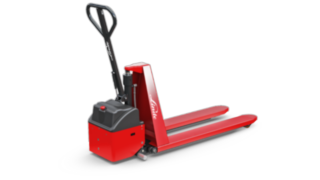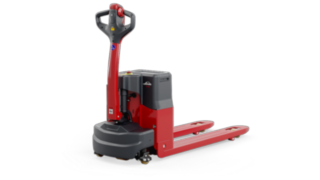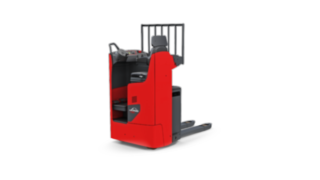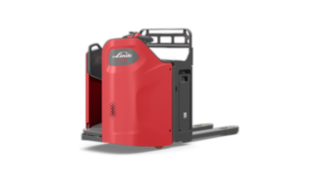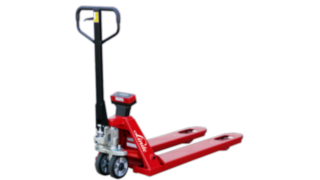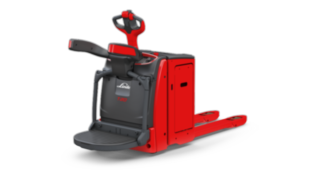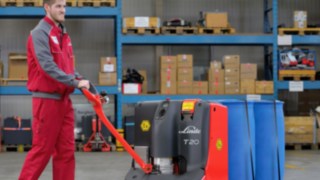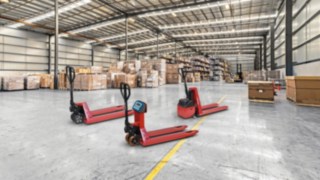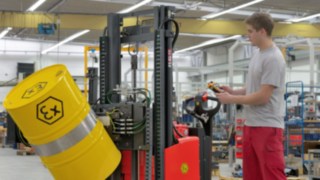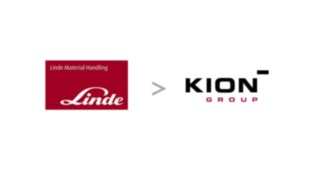Linden litiumioniteknologia
Energiajärjestelmä nykyisiin ja tuleviin intralogistiikkatarpeisiin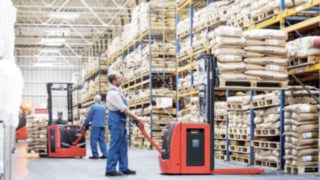
Maximum uptime and flexibility
Lisääntyvät kustannuspaineet, tiukat aikarajat ja ennakoimattomat tilaushuiput: logistiikka-alan uusi dynamiikka on muuttamassa varastolaitteiston ja haarukkatrukkien vaatimuksia. Ennen kaikkea laitteiston on oltava saatavilla jatkuvasti ja käyttömahdollisuuksiltaan monipuolista. Samanaikaisesti turvallisuus ja kustannustehokkuus ovat tärkeitä tekijöitä. Lisäksi tilanne koettelee energiajärjestelmiä.
Liikenteen sähköistyminen etenee muuallakin kuin vain autoalalla. Materiaalinkäsittelylaiteala on ollut tässä edelläkävijä jo pitkään. Sähköisten haarukkatrukkien kysyntä on ollut polttomoottorimalleja suurempaa jo jonkin aikaa. Haasteena on taata sama korkea käytettävyysaste kuin polttomoottoriajoneuvoissa. Litiumioniteknologia auttaa tässä. Teknologian hyöty on todistettu jokapäiväisessä käytössä esimerkiksi älypuhelimissa, ja haarukkatrukeissa se tarjoaa lukuisia etuja lyijyakkuihin verrattuna:
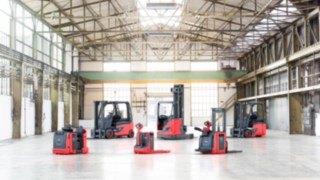
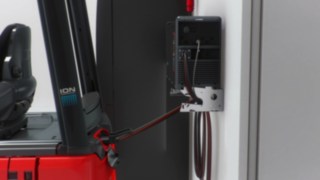
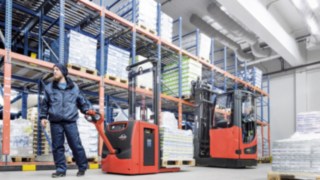
Ihanteellinen ratkaisu jokaiseen käyttötarkoitukseen
Litiumioniakut soveltuvat kaikkiin käyttötarkoituksiin. Niistä on kuitenkin erityistä hyötyä intensiivisissä käyttökohteissa, kuten monivuorokäytössä ja kylmävarastoissa.
Päästöjen ja lyijyakkuihin liittyvien mahdollisten epäpuhtauksien poistamisen ansiosta teknologia soveltuu erityisen hyvin tavallista suurempaa hienovaraisuutta edellyttäviin käyttötarkoituksiin, kuten lääke- ja ruokateollisuuteen.
Litiumioniakut ovat ympäristöystävällinen valinta yrityksille, jotka tarvitsevat vaihtoehdon polttomoottorikalustolle.
Linden litiumioniratkaisun hyödyt
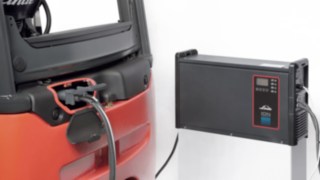
Linden litiumioniakut parantavat haarukkatrukkien ja varastolaitteiston käyttöä ja käsittelyä. Ne lisäävät trukkien käytettävyysastetta ja toimintojen taloudellisuutta, turvallisuutta ja ympäristövastuullisuutta. Monet käyttäjät arvostavat etuja, joita ne tarjoavat jokapäiväiseen työhön.
Kustannustehokkuus
Litiumioniakut parantavat käytössä olevan kaluston tehokkuutta. Tämä johtuu energiajärjestelmässä käytetyn teknologian tarjoamista aika- ja kustannushyödyistä päivittäiselle logistiikalle ja liittyvälle infrastruktuurille:
Järjestelmän korkea tehokkuus
Linden litiumioniratkaisu mahdollistaa järjestelmien poikkeuksellisen korkean tehokkuuden. Linden litiumioniakun ja laturin yhdistelmä parantaa energiatehokkuutta jopa 30 prosenttia lyijyakkuihin verrattuna. Tämä vähentää energiakustannuksia.
Älykäs akunhallinta
Lisäksi trukin ohjaus ja akunhallinta optimoidaan keskinäisesti esimerkiksi CAN-väylän kautta, joka mahdollistaa järjestelmien välisen tiedonsiirron. Näin ollen akkujärjestelmä tasapainottaa huippukuormia taaten samalla riittävän energiansyötön. Tämä suojaa akkua ja pidentää sen käyttöikää.
Pienemmät huolto- ja käsittelykulut
Litiumioniakut eliminoivat useita tavallisiin lyijyakkuihin liittyviä huolto- ja käsittelykustannuksia. Niihin lukeutuvat esimerkiksi toisen akun hankintakustannukset, akun vesitäytön henkilöstökustannukset ja akun vaihdon kustannukset.
Tiivis latausinfrastruktuuri
Lisäksi uusi teknologia ei edellytä monimutkaista latausinfrastruktuuria akkuhuoneineen ja kaasunpoistolaitteineen. Sen sijaan litiumioniakun laturi voidaan asentaa joustavasti sinne, missä sitä kulloinkin tarvitaan. Esimerkiksi lyhyt lataus voidaan suorittaa lähellä taukotiloja tai aivan käyttöalueen vieressä ajoajan lyhentämiseksi.
Saatavuus
Tasaisen ja tehokkaan logistiikan takaamiseksi varastonkäsittelylaitteiden ja haarukkatrukkien käytettävyysasteen on oltava mahdollisimman korkea. Tämä on yksi Linden litiumioniakkujen päävahvuuksista. Lyijyakuista poiketen teknologia on erittäin tehokas ja joustava latausjaksojen ja -tiheyden osalta.
Suurnopeuslataus
Linden akut voivat saavuttaa täyden varauksen jopa alle tunnissa. Jos trukkeja ei ole käytetty huomattavan intensiivisesti, lataus lounastauon aikana tarjoaa niille vielä muutaman tunnin käyttöaikaa.
Lyhyitä välilatauksia suositellaan
Tavallisia akkuja on suositeltavaa ladata täysissä jaksoissa, jotta ne säilyisivät hyvinä. Litiumioniakkujen osalta tilanne on toisenlainen: erittäin lyhyitä, vain muutaman minuutinkin, latausjaksoja ei ainoastaan sallita, vaan niitä myös suositaan. Akkujen ihanteellinen lataustaso on noin 20–80 prosenttia kokonaiskapasiteetista. Latausprosessin joustavuus parantaa trukkien käytettävyysastetta huomattavasti.
Mukautettava suojaus akun syväpurkaukselta
Linden CAN-väyläteknologian avulla voidaan määrittää yksittäisiä asetuksia, jotka suojaavat akkua syväpurkaukselta. Kun akun minimaalinen jäännöskapasiteetti lähestyy, litiumioniakkujen hallinta laskee ajo- ja nostotoimintojen tehoa. Arvoa voi säätää yksilöllisesti trukin käytettävyyden ja akun suojauksen täydellisen tasapainon saavuttamiseksi.
Erilaisia kapasiteetteja erilaisiin käyttötarkoituksiin
Linden jokaista akkutyyppiä on tarjolla kahdessa eri kapasiteetissa. Näin yritykset voivat mitoittaa energiavarantonsa kunkin trukin käyttöintensiteetin edellyttämällä tavalla. Esimerkiksi suurella akulla varustettuja haarukkatrukkeja voi käyttää kolmessa peräkkäisessä vuorossa ilman välilatausta.
Turvallisuus
Lisäksi Linden litiumioniteknologia tarjoaa parhaan mahdollisen suojauksen kuljettajalle ja trukille. Linden suunnittelijat ovat kehittäneet kattavan turvallisuuskonseptin koko akusta ja trukista koostuvalle järjestelmälle. Kehitysvaiheen aikana akuille tehdään erityisiä rasitus- ja törmäystestejä.
Ei vaarallisia kaasuja
Litiumioniakuissa ei ole lyijyakuissa ilmenevää vaaraa syntyvän vedyn muuttumisesta vaaralliseksi happivetykaasuksi. Lisäksi niitä ei tarvitse vaihtaa lyijyakkujen tapaan, joten kuljettajille ei aiheudu akunvaihtoon liittyvää vammariskiä. Koska litiumionikennot ovat käytännössä huoltovapaita, käyttäjät eivät joudu kosketuksiin vaarallisten happojen kanssa.
Törmäystestattu akkukotelo
Haarukkatrukkeihin liittyvissä onnettomuuksissa on yleensä kyse käsiteltävän tavaran painon aiheuttamista erittäin suurista voimista. Ajoneuvojen litiumioniakkujen suojaus myös tapaturmissa varmistetaan suorittamalla niille maksimikuormalla toteutettava törmäystesti. Videossa: 25 mm paksun teräskotelon ansiosta haarukka ei pääse tunkeutumaan akkuun edes suurella nopeudella. Näin ollen akun mekaaninen suunnittelu täyttää myös Linden korkeatasoiset standardit.
Monitasoinen turvajärjestelmä
Monitasoinen turvajärjestelmä suojaa Linden litiumioniakkuja kenno-, moduuli- ja akkutasolla. Lisäksi akunhallinta takaa akkujen optimaalisen käytön valvomalla ja ohjaamalla jatkuvasti ajoneuvon toimintoja, latausprosesseja ja akkujärjestelmää. Tämä ehkäisee ylipaineesta, ylikuumenemisesta, ylilataamisesta tai syväpurkauksesta johtuvia vaurioita.
Lisäksi niin ajoneuvo ja akku kuin niistä sekä laturista koostuva järjestelmä ovat saaneet testatusta turvallisuudesta kertovan CE-merkinnän. On yleistä, ettei erikseen ostettaville akuille ole myönnetty omaa merkintää.
Kestävyys
Viimeisintä teknologiaa hyödyntävät energiajärjestelmät ovat paitsi erittäin tehokkaita, myös erittäin turvallisia sekä ihmisille että ympäristölle. Linden litiumioniakut täyttävät kaikki kestävän kehityksen vaatimukset. Yhtenä esimerkkinä niiden käyttö on täysin päästötöntä.
Lisäksi tämä teknologia tekee haarukkatrukkien ja varastonkäsittelylaitteiden käsittelystä huomattavasti energiatehokkaampaa, joten sama teho saavutetaan pienemmällä energiankulutuksella.
Entistä pidempi elinkaari
Lisäksi litiumioniakkujen tuotanto tuottaa vähemmän saasteita kuin lyijyakkujen valmistus. Toinen tämän teknologian tarjoama etu on akkujen entistä pidempi elinkaari, joka osaltaan auttaa säästämään luonnonvaroja.
Kattava akkujen kierrätys
Litiumioniakut ovat osa tulevaisuuden ajoteknologiaa. Kasvava kysyntä herättää kysymyksen siitä, miten tätä resurssia voidaan käsitellä kestävästi. Pitkästä käyttöiästä huolimatta myös litiumioniakkujen suorituskyvyn rajat tulevat ennen pitkää vastaan. Linde Material Handlingilla kestävä kehitys alkaa akkujen tuotannosta ja jatkuu niiden käyttöiän päättymisen jälkeen. Erikoiskierrätyksellä on merkittävä rooli arvokkaiden metallien ja raakamateriaalin keräämisessä ja siirtämisessä suljettuun kiertoon.
Li-Cycle on saanut ISO 14001 (Ympäristöjärjestelmät)- ja ISO 45001 (Työterveys- ja työturvallisuusjärjestelmä) -sertifikaatin.
Linde on kehittänyt kattavan kierrätysprosessin yhdessä Li-Cyclen kanssa. Tässä prosessissa voidaan kierrättää turvallisesti lähes kaikki litiumakut niiden muodosta, koosta ja kemiallisesta koostumuksesta riippumatta. Myös vaurioituneet akut voidaan kierrättää. Li-Cycle kerää arvomateriaalit akkukennoista energiaa säästävän nestepohjaisen prosessin avulla. Jopa 95 prosenttia metallista voidaan palauttaa ja käyttää uusien akkujen valmistukseen.
Raakamateriaalien louhimiseen ja jalostukseen verrattuna kierrätysprosessi alentaa hiilidioksidipäästöjä 67 prosenttia, rikkioksidipäästöjä 86 prosenttia ja typpioksidipäästöjä 89 prosenttia jokaista akkumateriaalien metritonnia kohden. Lisäksi se pienentää vedenkulutusta 97 prosenttia. Tämä optimoi jo ennestään ympäristöystävällisten akkujen ekologista tasapainoa.
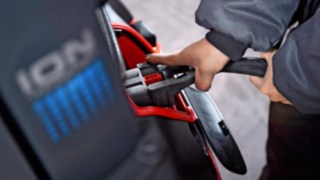
Ilmainen kierrätys kaikille Linden litiumioniakuille
Linde Material Handlingin kautta ostetut litiumioniakut voidaan kierrättää maksutta jätteenkäsittelysopimuksen voimassaolon aikana. Akut voidaan palauttaa mille tahansa Linde-verkoston palvelukumppanille tai suoraan Li-Cyclelle. Tämä edellyttää muutamia tietoja, jotka on painettu akkuun. Kun olet lähettänyt tiedot, logistiikkakumppanimme ottaa suoraan yhteyttä sinuun ja hoitaa akkujen kuljetuksen.
